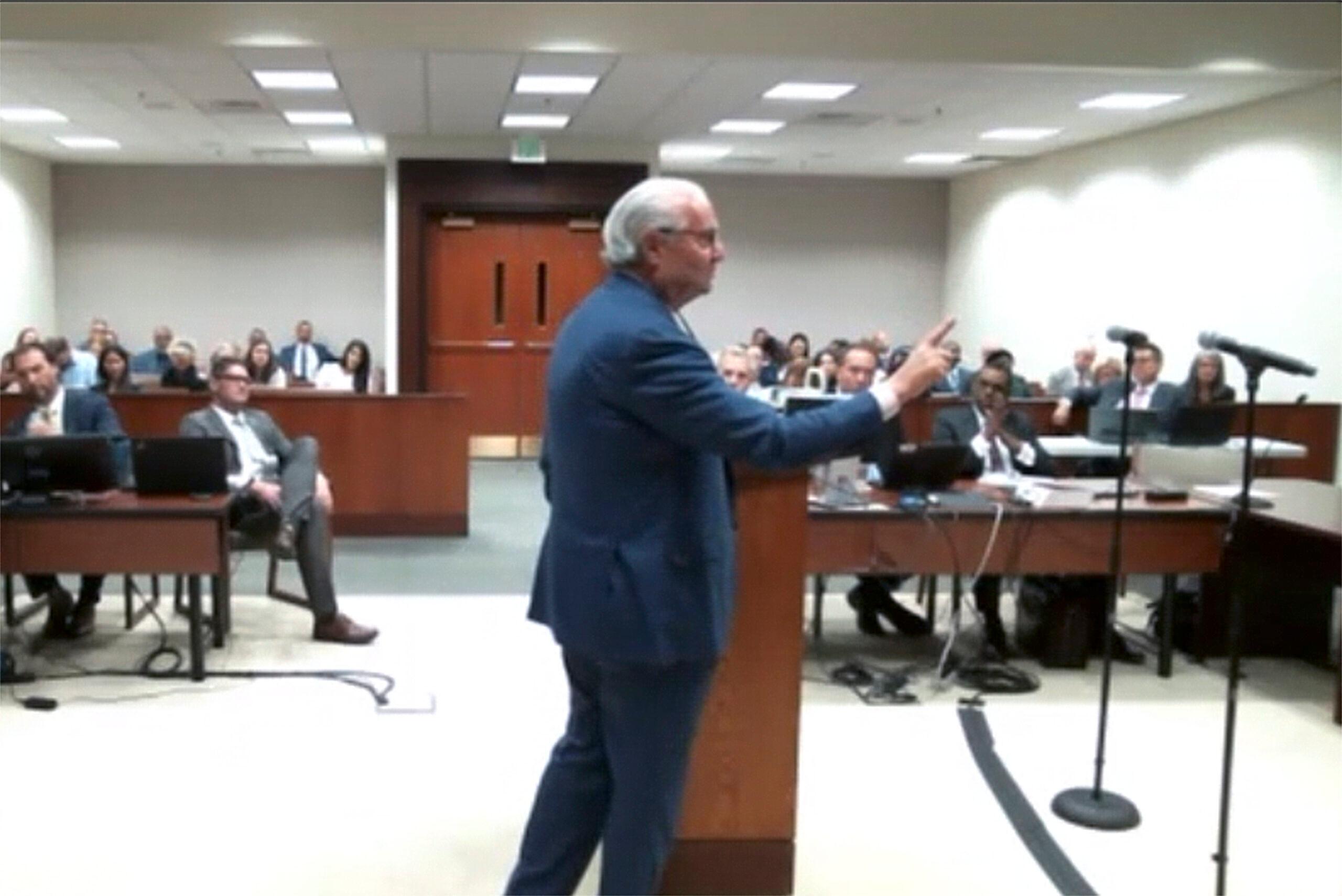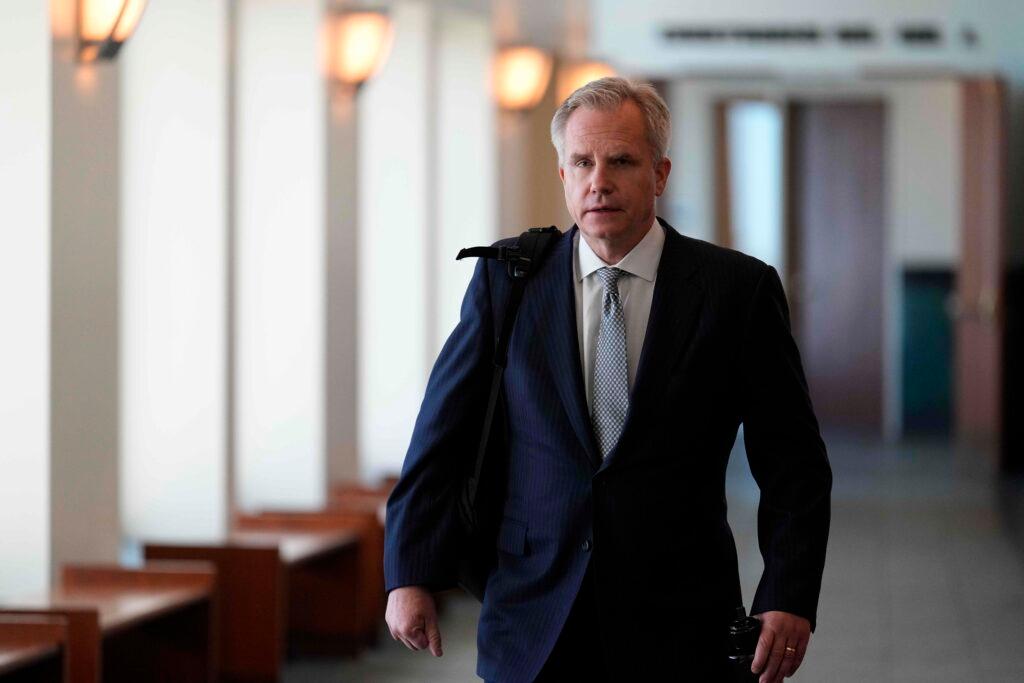
Day four of the trial of the two Aurora officers charged in the death of Elijah McClain revealed more details about what occurred the night of Aug. 24, 2019.
People on the stand Tuesday included the owner of the convenience store where McClain was seen on surveillance video buying iced tea, the call taker for Aurora that first entered the 911 call as a “suspicious person” in the system, and the dispatcher who called for a one-officer car and backup to the intersection where McClain was seen in a coat and ski mask, waving his arms.
Officer Randy Roedema and former officer Jason Rosenblatt, the backup officers called in to assist, face charges of criminally negligent homicide, manslaughter and assault. They have pleaded not guilty.
At the convenience store
Raminder Aulakh owns three gas stations in the metro area, including the Shell station where McClain was seen on security cameras, wearing a coat and ski mask on an August night while buying drinks.
There are 16 cameras trained on that Shell, and several videos showing McClain were played for the jury. The defense has called the intersection where McClain encountered police a “high crime area” and alluded to the need for security, but Aulahk said a surveillance system is just part of the job.
“You should have a good security system, especially when you're running a convenience business,” she said.
When asked about crime, or robberies in the area, Aulahk said her biggest worry is a misdemeanor: shoplifting.
“That's my primary concern. People putting beer in their pocket, candy. It could be $10 worth of stuff, but at the end it does add up,” Aulakh said.
Defense attorney for Rosenblatt, Harvey Steinberg, attempted to paint a picture of McClain, in his coat and mask, as cause for concern on a warm night, asking Aulakh, “And somebody walks into the store with a face mask. Did that give you concern?”
To the convenience store owner who has likely seen a fair share of strange things, it depends.
“If this person is not creating a commotion or is not threatening, then I would say no,” she said. She went on to explain that even wearing a coat in the summer is not that out of place to her.
“It's absolutely common. This guy, Marco, every day I have to tell him, ‘Marco, you will get roasted. It's so hot.’ But he insists on wearing this hoodie,” Aulakh said.
The 911 call taker
As an employee of Aurora’s 911 system, Debra Furler took the 911 call on Elijah McClain on the night he was violently arrested. The recording of the call was also played for the jury. The caller described McClain wearing a black mask and acting suspiciously.
It was Furler’s job to enter the incident into a computer system that officers and dispatchers can see and add notes.
“That's the only thing we can go off of is what a caller is telling us,” she said.
Furler said the two options she had to categorize the call about McClain was either “suspicious person” or “welfare check,” and she decided to go with the former.
“Let's say if he were to have been walking in the middle of the street trying to get hit by a car or stumbling in any way that he feels like he was injured or anything like that, I would've gone for welfare check,” Furler said. “But, a suspicious person just because there wasn't anything that we were worried about him being a danger to himself type thing.”
The prosecution asked Furler a series of quick questions about the 911 call, to which Furler quickly responded (so fast that Judge Mark Warner had to remind her to pause before her answers so his court reporter could catch up). Here is the exchange:
Prosecution attorney: A few questions about the 911 call. When that came in, did anybody report that there had been damage to any property?
Debra Furler: No.
Was there a report of any vandalism?
No.
Was there a report of any kind of break-in?
No.
Was there a report of any kind of property crime?
No.
How about reports of anybody being injured?
No.
Were there reports of anybody being in danger?
Nope.
Did that call or report any crimes that they thought had happened?
No.
Furler also spoke at length about the priorities that 911 calls are given — usually priority 0 through 4.
“Priority one means this is an emergent call like a shooting or somebody's injured or an active call happening right now. Priority two is it's happening right now, but nobody's dying basically,” Furler said. “Priority three would be… a cold case: I walked outside, my car was vandalized, no suspect on scene. Priority four is even colder. Priority four would almost be like a civil matter type thing. There's no actual criminal thing happening,”
Once Furler entered “suspicious person” the computer auto-populated the priority as two, which meant that two police officers would be dispatched.
“Our policy is priority one and two calls usually always get two officers,” Furler said.

She was also asked briefly about a change in the nature of the call by someone identified as Captain Eight, who was later identified as former Aurora officer, Cpt. Stephen Redfearn.
“Well, I can tell you just based off what I'm seeing, Captain Eight changed the call, changed the event, to “assault on a police officer.”
That change showed up in the dispatch computer system after midnight Aug. 25, 2019.
The 911 dispatcher
An emergency communications dispatcher for the city of Aurora, Paula Hull, was the last person to take the stand on Tuesday.
She was asked questions similar to those asked of Furler — did the person wearing a mask and waving his arms commit a crime? Were they a danger?
“I am only aware of what was in the notes of the call,” Hull said.
Hull was the dispatcher who called for Rosenblatt and Roedema as “cover” for the first responding officer, Nathan Woodyard, who faces the same charges of criminally negligent homicide, manslaughter and assault in the death of McClain.
She also confirmed the identity of Captain Eight as Redfearn and that he changed the call in the computer system to an assault on an officer.
Hull said it’s not uncommon for sergeants and captains to change or update calls in the system.
“You want the information to be as accurate as possible,” she said.
Hull will be back on the stand Wednesday for the rest of her cross examination, but it won’t be the first thing in the morning. She told the court she is working the overnight shift on dispatch and would complete her testimony later in the day.









